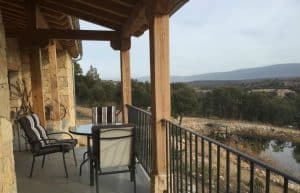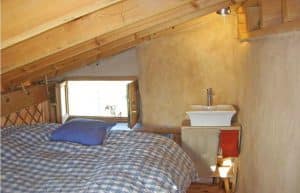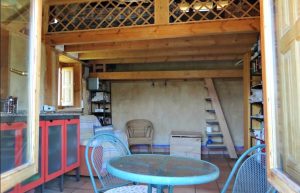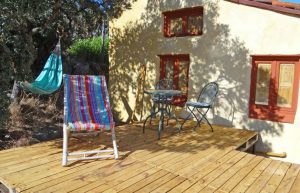GoEco > Europe > Spain > Wildlife Research and Ecological Farming > Wildlife Research and Ecological Farming – Images

Please note: This volunteer program is on hold. In the following links you can check out our open Volunteer Programs in Spain:
This project was started by a Swiss geographer and an Irish biologist after witnessing the decline in traditional methods of farming, which maintained the variety of animal and plant life in Europe for millennia. The couple chose the village of Requijada to live on a smallholding and conduct research on nature and agriculture. The goal is to preserve the land and revive traditional housing and farming with the help of new technologies. The center also focuses strongly on wildlife research and observation, to better understand the landscape and wildlife of the surrounding area. The center maintains a low ecological footprint with eco-friendly buildings and a wastewater treatment system based on the natural activity of aquatic plants.
Throughout the year, the center also offers a range of educational activities open to the public (through prior booking), to educate visitors on their sustainable practices, the environment and the animals to whom the landscape is home.







What’s Included



What’s not Included
Flights, visas (if required), travel health insurance, transportation from airport to Segovia and from Segovia to airport, overnight stay in Segovia upon arrival, personal expenses,

In the middle of the Iberian Peninsula and at the foot of the Sierra de Guadarrama National Park lies the small village of Requijada, where merely 20 people reside. This project is in the village. Until recently, this picturesque area has been one of nature’s best-kept secrets. In fact, the Regional Park has a more diverse range of landscapes with a richer biodiversity than Sierra de Guadarrama, giving it incomparable beauty and appeal.

During your placement, your volunteer tasks will be a balanced combination of research and smallholding.
RESEARCH
This center focuses heavily on ethology, the study of animal behavior, with an emphasis on behavioral patterns that occur in the wild.
Horses – The research is primarily focused on natural horsemanship which is the keeping, handling and training of horses based on equine ethology. The key to their findings is observation, enabling the researchers to get to know the horses before they start building a relationship. While you will be involved in the observation of the horses’ behavior, some of the other tasks with the horses may include:
The research gained through observation is directly put into practice. The learner then refines their understanding of the horses and can experience a richer understanding in working with them.
Magpies – There is also a unique opportunity involving azure-winged magpies for any volunteer who is interested. The team are following the local band of azure-winged magpies in the area. These beautiful jet-black-headed, blue winged birds are around throughout the year, especially in the spring when nesting and rearing young makes them particularly interactive.
The research findings for the magpies are used to produce books and articles. The first six years of the center’s research were devoted to a book about the Iberian azure-winged magpie. For the next while, the center plans to produce an article for the ornithological review “ARDEOLA”, of the Spanish Ornithological Society (SEO).
Other animals – In the countryside you will also learn to note observations about other wildlife. You will quickly learn how to recognize certain animal’s tracks as well as flight and song patterns.
SMALLHOLDING
The center also has a farming component. The center has both a smallholding (small farm) and vegetable garden that need tending.
Smallholding/Vegetable Garden – The work in the vegetable garden in seasonal. In March, you will prepare the soil using horse traction. From March to June, you will be planting and weeding. The work in the smallholding will be with the poultry and horses. Your precise activities will be decided upon once you arrive.
Repairs – You may need to deal with repairs and improvements to fences and gates around the center.
Typical Day: The hours you volunteer are up to you, but we recommend 4-6 hours a day, 5 days a week, to make a meaningful contribution. You also have the option to volunteer on weekends, as animals require daily care. Your day will usually start with breakfast in your accommodation before getting ready for activities, which start at 10 am. If you are interested in the study of azure – winged magpies, then your day will start at dawn to observe the birds’ behaviour. In this case, you will have time for breakfast afterwards. The rest of the day will consist of observation, research and any needed repairs on the grounds.










Please take note of this project’s minimum requirements:

Once a week or so you’ll be making a trip to the old town of Segovia, 35 km from the project, for shopping. With so much to explore, you may want to extend your time in this ancient town. If you are interested in Roman architecture, you must go see Segovia’s Aqueduct. Built c. A.D. 50, this astonishingly well-kept structure is what makes Segovia so spectacular. If you have more time, you should also check out the Alcázar, Spain’s most famous castle. All of these great structures have been added to the UNESCO World Heritage list and are definitely worth a few trips.
We highly recommend having Segovia’s world famous churros (a type of Spanish donut) with delicious hot chocolate. This combination is heavenly and a must for any traveller within Spain.
With Madrid only 130 km away, you should also make time for a visit there before or after your volunteer experience. For those who are looking for a great aerial view of the surrounding area, book a hot-air balloon ride over Guadarrama National Park. You can book this tour online or in one of Madrid’s tourist centers.
At an additional cost the following excursions can also be arranged:

© 2022 GOECO | All rights reserved
Develop & Design | Msite